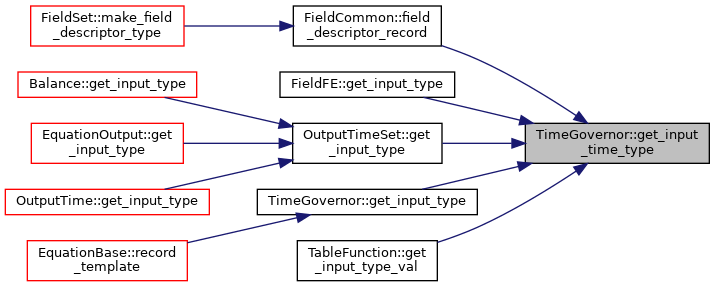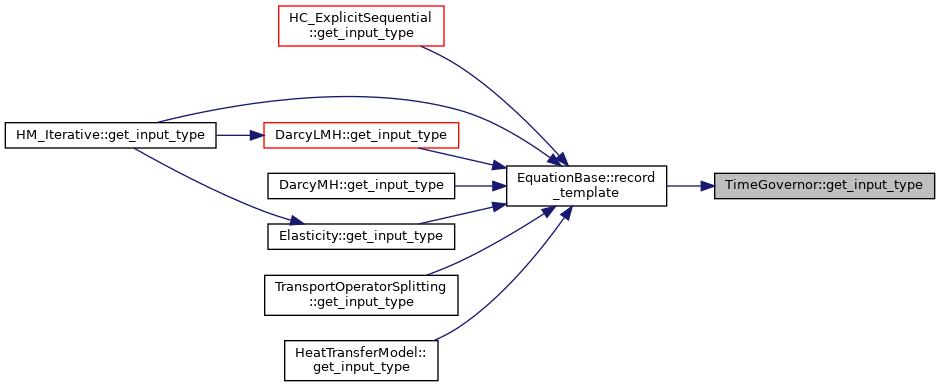Basic time management functionality for unsteady (and steady) solvers (class Equation). More...
#include <time_governor.hh>
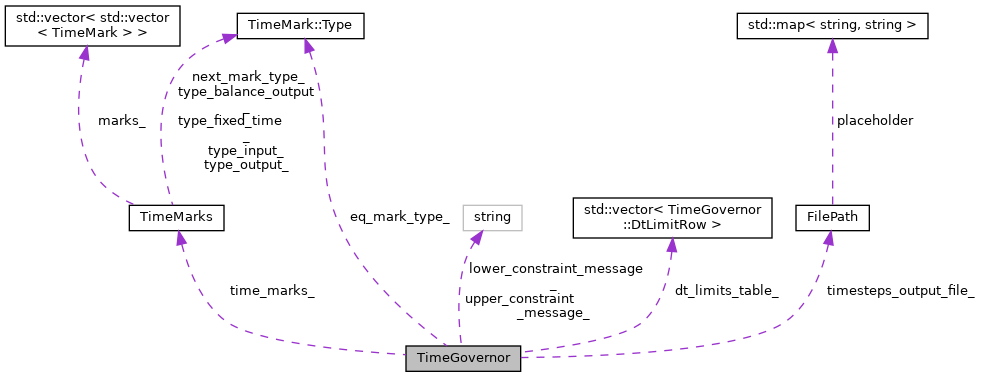
Classes | |
| struct | DtLimitRow |
| Structure that stores one record of DT limit. More... | |
Public Member Functions | |
| DECLARE_INPUT_EXCEPTION (ExcTimeGovernorMessage,<< EI_Message::val) | |
| TYPEDEF_ERR_INFO (EI_Index, int) | |
| TYPEDEF_ERR_INFO (EI_BackIndex, unsigned int) | |
| TYPEDEF_ERR_INFO (EI_HistorySize, unsigned int) | |
| DECLARE_EXCEPTION (ExcMissingTimeStep,<< "Time step index: "<< EI_Index::val<< ", history index: "<< EI_BackIndex::val<< " out of history of size: "<< EI_HistorySize::val) | |
| TimeGovernor (const Input::Record &input, TimeMark::Type fixed_time_mask=TimeMark::none_type, bool timestep_output=true) | |
| Constructor for unsteady solvers. More... | |
| TimeGovernor (double init_time=0.0, TimeMark::Type fixed_time_mask=TimeMark::none_type) | |
| Default constructor - steady time governor. More... | |
| TimeGovernor (double init_time, double dt) | |
| ~TimeGovernor () | |
| bool | is_default () |
| void | set_dt_limits (double min_dt, double max_dt, Input::Array dt_limits_list) |
| Sets dt limits for time dependent DT limits in simulation. More... | |
| int | set_upper_constraint (double upper, std::string message) |
| Sets upper constraint for the next time step estimating. More... | |
| int | set_lower_constraint (double lower, std::string message) |
| Sets lower constraint for the next time step estimating. More... | |
| double | fix_dt_until_mark () |
| Fixing time step until fixed time mark. More... | |
| void | next_time () |
| Proceed to the next time according to current estimated time step. More... | |
| double | reduce_timestep (double factor) |
| Force timestep reduction in particular in the case of failure of the non-linear solver. More... | |
| const TimeStep & | step (int index=-1) const |
| TimeMark::Type | equation_mark_type () const |
| TimeMark::Type | equation_fixed_mark_type () const |
| void | add_time_marks_grid (double step, TimeMark::Type mark_type=TimeMark::none_type) const |
| bool | is_current (const TimeMark::Type &mask) const |
| TimeMarks::iterator | next (const TimeMark::Type &mask) const |
| TimeMarks::iterator | last (const TimeMark::Type &mask) const |
| double | upper_constraint () const |
| double | lower_constraint () const |
| double | end_of_fixed_dt () const |
| bool | is_changed_dt () const |
| double | init_time () const |
| double | t () const |
| double | last_dt () const |
| double | last_t () const |
| double | dt () const |
| double | estimate_dt () const |
| Estimate choice of next time step according to actual setting of constraints. More... | |
| double | estimate_time () const |
| double | end_time () const |
| End time. More... | |
| bool | is_end () const |
| Returns true if the actual time is greater than or equal to the end time. More... | |
| bool | is_steady () const |
| Returns true if the time governor is used for steady problem. More... | |
| int | tlevel () const |
| void | view (const char *name="") const |
| double | read_time (Input::Iterator< Input::Tuple > time_it, double default_time=std::numeric_limits< double >::quiet_NaN()) const |
| double | read_coef (Input::Iterator< Input::Record > unit_it) const |
| double | get_coef () const |
| std::shared_ptr< TimeUnitConversion > | get_unit_conversion () const |
| Getter for time unit conversion object. More... | |
Static Public Member Functions | |
| static const Input::Type::Record & | get_input_type () |
| static const Input::Type::Tuple & | get_input_time_type (double lower_bound=-std::numeric_limits< double >::max(), double upper_bound=std::numeric_limits< double >::max()) |
| static TimeMarks & | marks () |
Static Public Attributes | |
| static const double | max_end_time = MAX_END_TIME |
| static const double | inf_time = numeric_limits<double>::infinity() |
| Infinity time used for steady case. More... | |
| static const double | time_step_precision = 16*numeric_limits<double>::epsilon() |
Private Member Functions | |
| void | init_common (double init_time, double end_time, TimeMark::Type type) |
| Common part of the constructors. Set most important parameters, check they are valid and set default values to other. More... | |
| void | set_permanent_constraint () |
| Sets permanent constraints for actual time step. More... | |
Private Attributes | |
| boost::circular_buffer< TimeStep > | recent_steps_ |
| Circular buffer of recent time steps. Implicit size is 3. More... | |
| double | init_time_ |
| Initial time. More... | |
| double | end_of_fixed_dt_interval_ |
| End of interval if fixed time step. More... | |
| double | end_time_ |
| End time of the simulation. More... | |
| double | fixed_time_step_ |
| Next fixed time step. More... | |
| bool | is_time_step_fixed_ |
| Flag that is set when the fixed step is set (lasts only one time step). More... | |
| bool | time_step_changed_ |
| Flag is set if the time step has been changed (lasts only one time step). More... | |
| std::string | upper_constraint_message_ |
| Description of the upper constraint. More... | |
| std::string | lower_constraint_message_ |
| Description of the upper constraint. More... | |
| double | upper_constraint_ |
| Upper constraint for the choice of the next time step. More... | |
| double | lower_constraint_ |
| Lower constraint for the choice of the next time step. More... | |
| double | max_time_step_ |
| Permanent upper limit for the time step. More... | |
| double | min_time_step_ |
| Permanent lower limit for the time step. More... | |
| double | last_upper_constraint_ |
| Upper constraint used for choice of current time. More... | |
| double | last_lower_constraint_ |
| Lower constraint used for choice of current time. More... | |
| TimeMark::Type | eq_mark_type_ |
| TimeMark type of the equation. More... | |
| bool | steady_ |
| True if the time governor is used for steady problem. More... | |
| std::shared_ptr< TimeUnitConversion > | time_unit_conversion_ |
| Conversion unit of all time values within the equation. More... | |
| std::vector< DtLimitRow > | dt_limits_table_ |
| Table of DT limits. More... | |
| unsigned int | dt_limits_pos_ |
| Index to actual position of DT limits. More... | |
| FilePath | timesteps_output_file_ |
| File path for timesteps_output_ stream. More... | |
| std::ofstream | timesteps_output_ |
| Handle for file for output time steps to YAML format. More... | |
| double | last_printed_timestep_ |
| Store last printed time to YAML output, try multiplicity output of one time. More... | |
| bool | timestep_output_ |
| Special flag allows forbid output time steps during multiple initialization of TimeGovernor. More... | |
| bool | limits_time_marks_ |
| Allows add all times defined in dt_limits_table_ to list of TimeMarks. More... | |
| friend | TimeMarks |
Static Private Attributes | |
| static const unsigned int | size_of_recent_steps_ = 3 |
| static TimeMarks | time_marks_ = TimeMarks() |
Detailed Description
Basic time management functionality for unsteady (and steady) solvers (class Equation).
Common features and unsteady time governor (TG)
This class provides algorithm for selecting next time step, and information about current time step frame. Step estimating is constrained by several bounds (permanent maximal and minimal time step, upper and lower constraint of time step). The permanent constraints are set in the constructor from the input record so that user can set the time step constraints for the whole simulation. Function set_dt_limits() should be used only in very specific cases and possibly right after the constructor before using other functions of TG.
Choice of the very next time step can be constrained using functions set_upper_constraint() and set_lower_constraint(). Lower and upper constraints are set equal to permanent ones in the constructor and can only become stricter. If one tries to set these constraints outside the interval of the previous constraints, nothing is changed and a specified value is returned. Upper and lower constraints are reset in function next_time() to the permanent constraints.
The later one can be called multiple times with various constraint values and we use the minimum of them. Function next_time() choose the next time step in such a way that it meets actual constraints and a uniform discrete time grid with this step hits the nearest fixed time in lowest possible number of steps.
The fixed times are time marks of TimeMarks object passed at construction time with particular mask.
There is just one set of time marks for the whole problem. Therefore TimeMarks object is static and is shared umong all the equations and time governors. Each equation creates its own specific time mark type.
Information provided by TG includes:
- actual time, last time, end time
- actual time step
- number of the time level
- end of interval with fixed time step
- time comparison
- static pointer to time marks
Steady time governor
Steady TG can be constructed by default constructor (initial time is zero) or by constructor with initial time as parameter. End time and time step are set to infinity. One can check if the time governor is steady by calling is_steady(). Calling estimate_dt() will return infinity.
Setting constraints have no consequences. Calling fix_dt_until_mark() will only return zero and will not do anything.
The steady TG works in two states. At first the time is set to initial and time level is equal zero. To use steady TG properly one should call next_time() after the computation of steady problem is done. Current time is then set to infinity, time level is set to 1 and calling estimate_dt() will return zero.
Note: For example class TransportNothing (which computes really nothing) uses also steady TG but it calls next_time() immediately after TG's construction. This means that the 'computation'of transport is done.
Definition at line 310 of file time_governor.hh.
Constructor & Destructor Documentation
◆ TimeGovernor() [1/3]
| TimeGovernor::TimeGovernor | ( | const Input::Record & | input, |
| TimeMark::Type | fixed_time_mask = TimeMark::none_type, |
||
| bool | timestep_output = true |
||
| ) |
Constructor for unsteady solvers.
- Parameters
-
input accessor to input data fixed_time_mask TimeMark mask used to select fixed time marks from all the time marks. timestep_output enable/forbid output of time steps to YAML file This value is bitwise added to the default one defined in TimeMarks::type_fixed_time().
Definition at line 293 of file time_governor.cc.
◆ TimeGovernor() [2/3]
|
explicit |
Default constructor - steady time governor.
OBSOLETE.
We can have "zero step" steady problem (no computation, e.g. EquationNothing) and one step steady problem (e.g. steady water flow).
Time is set to zero, time step and end time to infinity.
First call of next_time() pushes the actual time to infinity.
However, you have to use full constructor for the "steady problem" that has time-variable input data.
Has a private pointer to static TimeMarks and can access them by marks().
Definition at line 378 of file time_governor.cc.
◆ TimeGovernor() [3/3]
| TimeGovernor::TimeGovernor | ( | double | init_time, |
| double | dt | ||
| ) |
The aim of this constuctor is simple way to make a time governor without Input interface.
TODO: Partially tested as part of field test. Needs its own unit test.
Definition at line 350 of file time_governor.cc.
◆ ~TimeGovernor()
| TimeGovernor::~TimeGovernor | ( | ) |
Destructor.
Definition at line 395 of file time_governor.cc.
Member Function Documentation
◆ add_time_marks_grid()
| void TimeGovernor::add_time_marks_grid | ( | double | step, |
| TimeMark::Type | mark_type = TimeMark::none_type |
||
| ) | const |
Add sequence of time marks starting from the initial time up to the end time with given step. Time marks type combines given mark_type (none by default) and native mark type of the time governor.
Definition at line 605 of file time_governor.cc.
◆ DECLARE_EXCEPTION()
| TimeGovernor::DECLARE_EXCEPTION | ( | ExcMissingTimeStep | , |
| << "Time step index: "<< EI_Index::val<< " | , | ||
| history index:"<< EI_BackIndex::val<< " out of history of size:"<< EI_HistorySize::val | |||
| ) |
◆ DECLARE_INPUT_EXCEPTION()
| TimeGovernor::DECLARE_INPUT_EXCEPTION | ( | ExcTimeGovernorMessage | , |
| << EI_Message::val | |||
| ) |
◆ dt()
|
inline |
Length of actual time interval; i.e. the actual time step.
Definition at line 558 of file time_governor.hh.
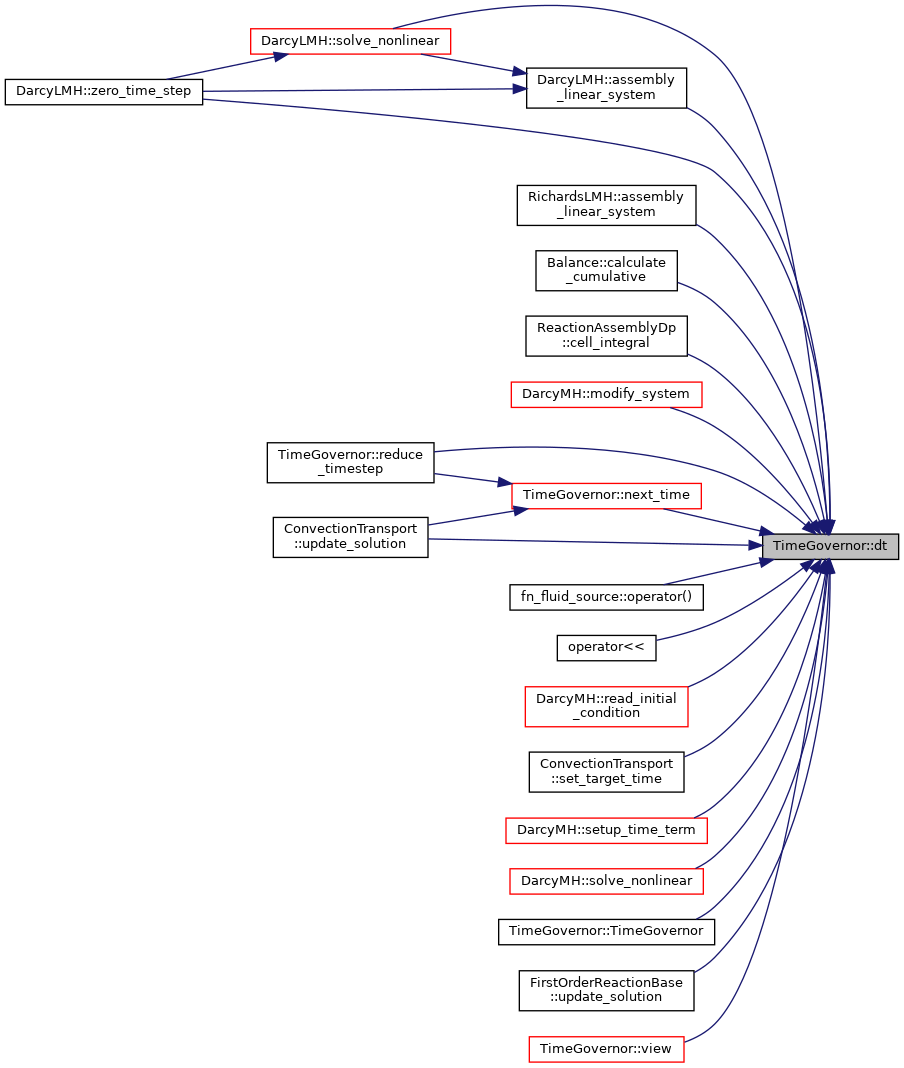
◆ end_of_fixed_dt()
|
inline |
End of interval with currently fixed time step. Can be changed by next call of method fix_dt_until_mark.
Definition at line 516 of file time_governor.hh.
◆ end_time()
|
inline |
End time.
Definition at line 584 of file time_governor.hh.
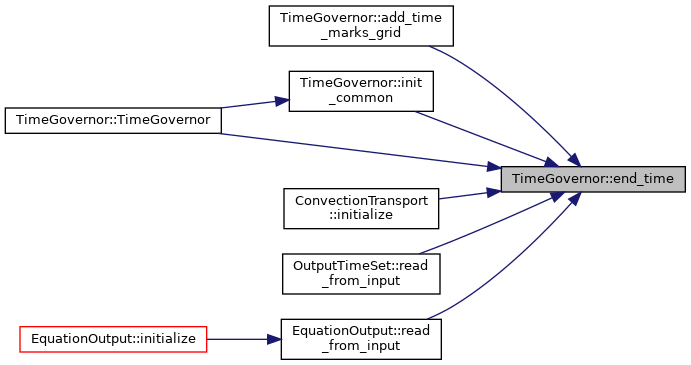
◆ equation_fixed_mark_type()
|
inline |
Specific time mark of the fixed times of the equation owning the time governor.
Definition at line 474 of file time_governor.hh.
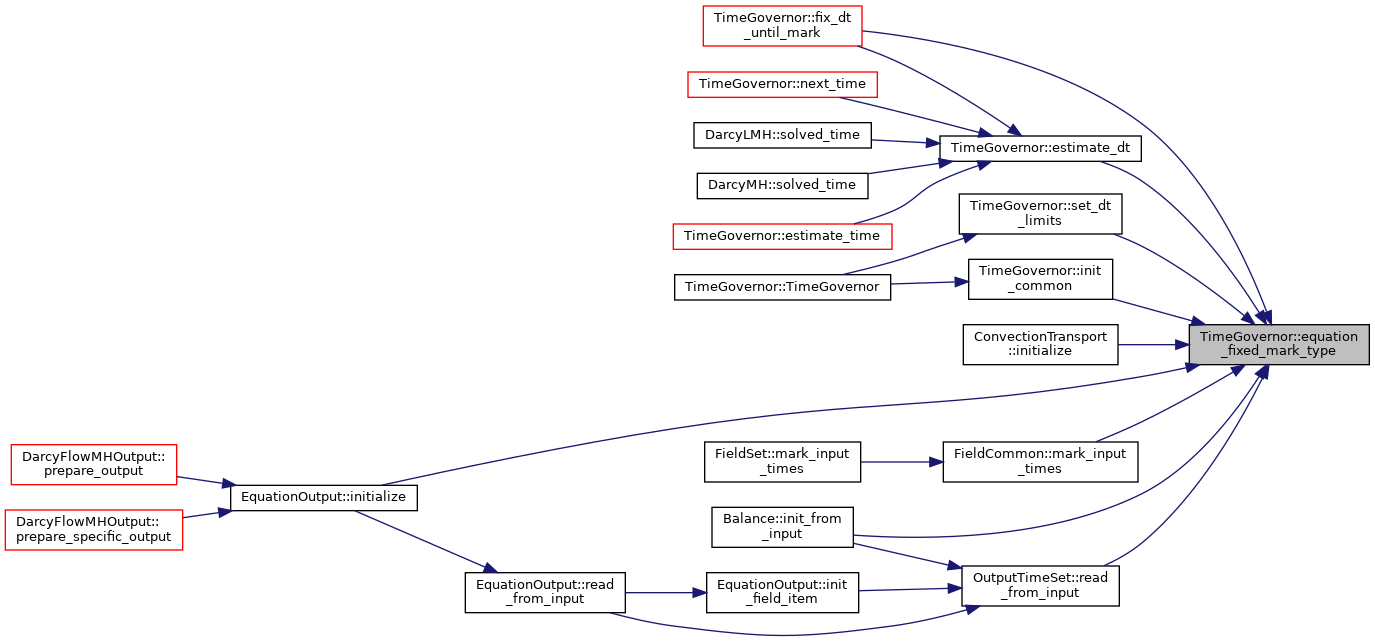
◆ equation_mark_type()
|
inline |
Specific time mark of the equation owning the time governor.
Definition at line 468 of file time_governor.hh.
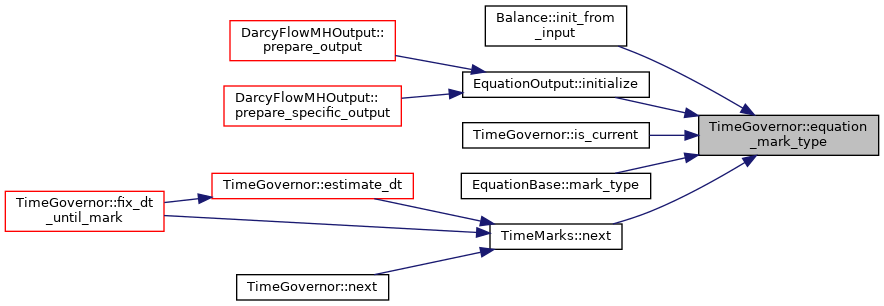
◆ estimate_dt()
| double TimeGovernor::estimate_dt | ( | ) | const |
Estimate choice of next time step according to actual setting of constraints.
Precedence of constraints:
- meet next fixed time (always satisfied)
- permanent upper constraint (always satisfied)
- upper constraint (always satisfied)
- lower constraint (satisfied if not in conflict with 1.)
- permanent lower constraint (satisfied if 4.)
- else writes the difference between lower constraint and estimated time step
- If there are more then one step to the next fixed time, try to use the last time step if it is nearly the same.
Definition at line 628 of file time_governor.cc.
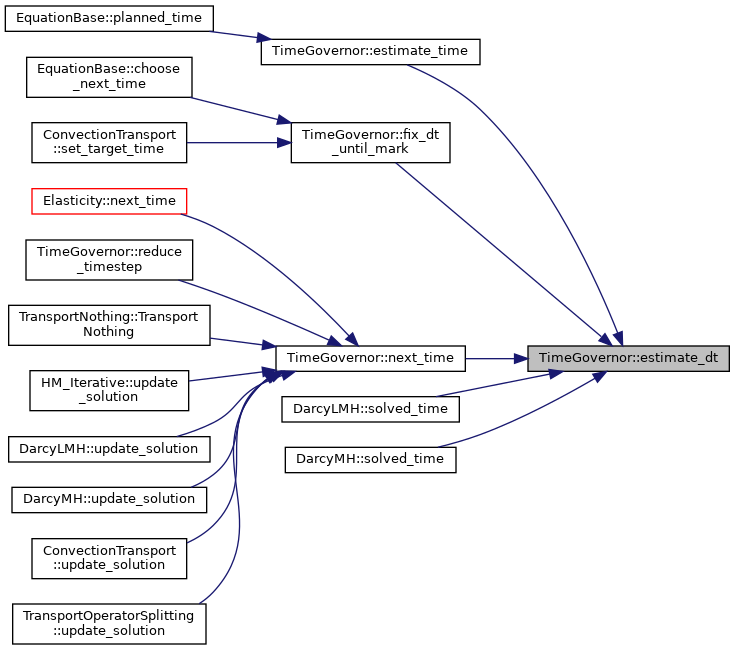
◆ estimate_time()
|
inline |
Estimate next time.
Definition at line 580 of file time_governor.hh.

◆ fix_dt_until_mark()
| double TimeGovernor::fix_dt_until_mark | ( | ) |
Fixing time step until fixed time mark.
Fix time step until first fixed time mark. When called inside an already fixed interval, it overwrites previous setting.
- Returns
- actual end of fixed time step.
Definition at line 594 of file time_governor.cc.

◆ get_coef()
| double TimeGovernor::get_coef | ( | ) | const |
Return global time unit coefficient of equation. Shortcut for time_unit_conversion_ function.
Definition at line 802 of file time_governor.cc.
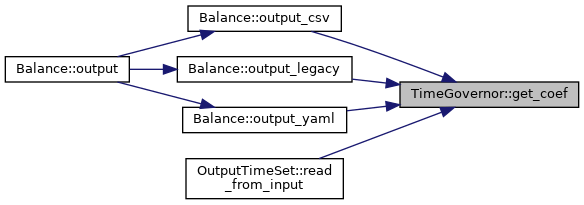
◆ get_input_time_type()
|
static |
◆ get_input_type()
|
static |
◆ get_unit_conversion()
| std::shared_ptr< TimeUnitConversion > TimeGovernor::get_unit_conversion | ( | ) | const |
Getter for time unit conversion object.
Definition at line 807 of file time_governor.cc.

◆ init_common()
|
private |
Common part of the constructors. Set most important parameters, check they are valid and set default values to other.
Set main parameters to given values. Check they are correct. Set soft and permanent constrains to the same, the least restricting values. Set time marks for the start time and end time (if finite).
Definition at line 404 of file time_governor.cc.

◆ init_time()
|
inline |
Initial time getter.
Definition at line 529 of file time_governor.hh.
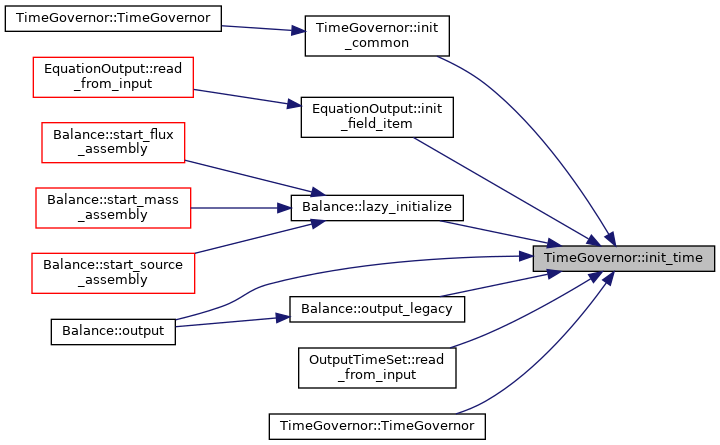
◆ is_changed_dt()
|
inline |
Getter for dt_changed. Returns whether the time step has been changed.
Definition at line 522 of file time_governor.hh.

◆ is_current()
| bool TimeGovernor::is_current | ( | const TimeMark::Type & | mask | ) | const |
Simpler interface to TimeMarks::is_current().
Definition at line 620 of file time_governor.cc.
◆ is_default()
|
inline |
Returns true if the time governor was set from default values
Definition at line 381 of file time_governor.hh.
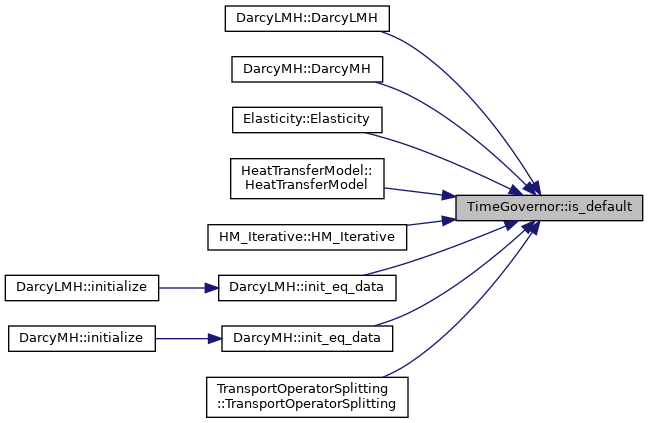
◆ is_end()
|
inline |
Returns true if the actual time is greater than or equal to the end time.
Definition at line 588 of file time_governor.hh.
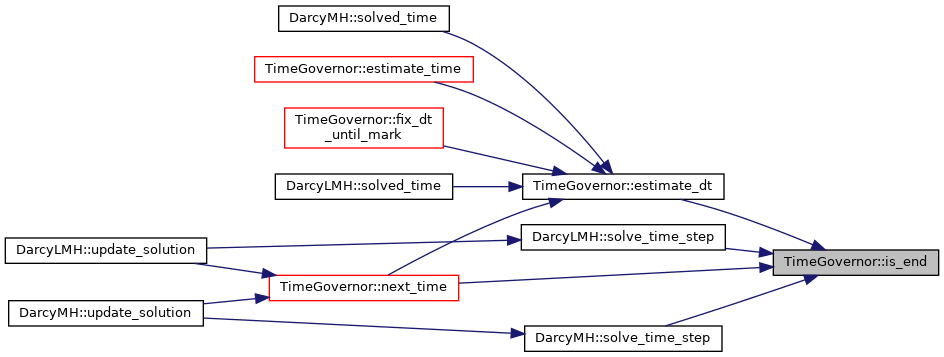
◆ is_steady()
|
inline |
Returns true if the time governor is used for steady problem.
Definition at line 592 of file time_governor.hh.
◆ last()
|
inline |
Simpler interface to TimeMarks::last().
Definition at line 498 of file time_governor.hh.
◆ last_dt()
|
inline |
Previous time step.
Definition at line 541 of file time_governor.hh.

◆ last_t()
|
inline |
Previous time.
Definition at line 549 of file time_governor.hh.

◆ lower_constraint()
|
inline |
Returns lower constraint.
Definition at line 510 of file time_governor.hh.

◆ marks()
|
inlinestatic |
Getter for time marks.
Definition at line 331 of file time_governor.hh.
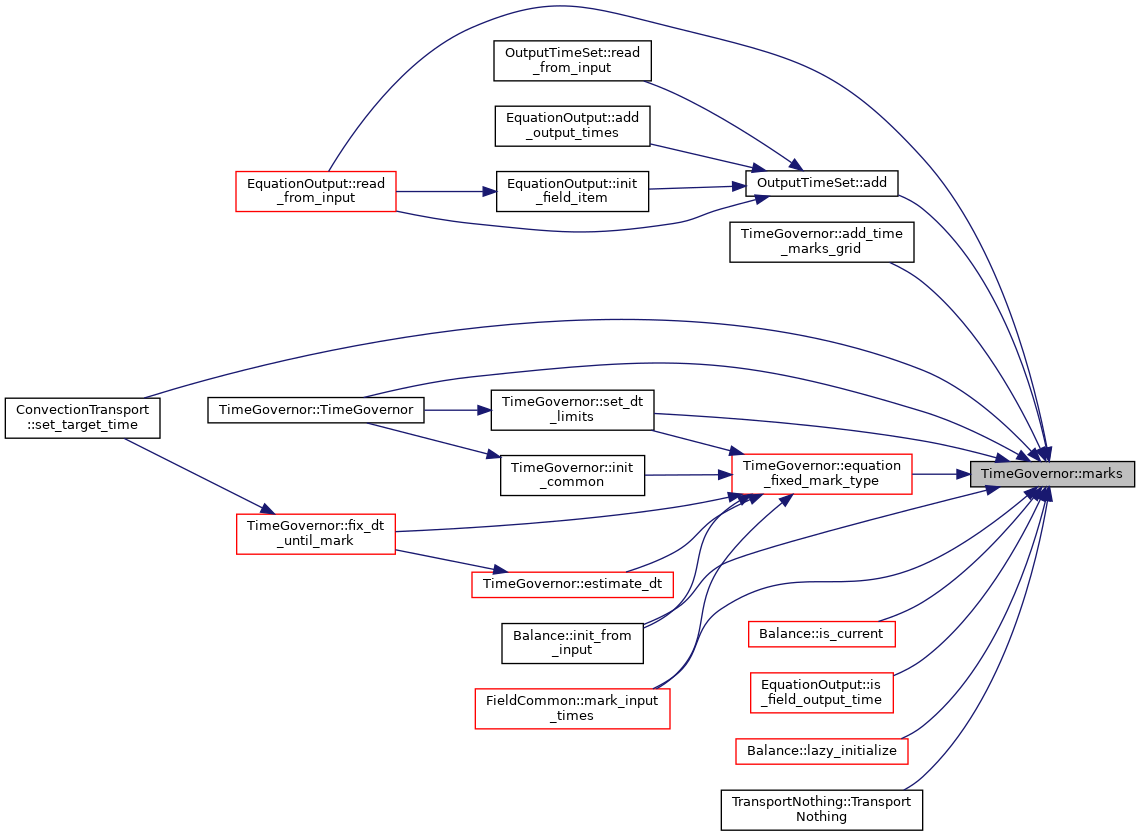
◆ next()
|
inline |
Simpler interface to TimeMarks::next().
Definition at line 492 of file time_governor.hh.
◆ next_time()
| void TimeGovernor::next_time | ( | ) |
Proceed to the next time according to current estimated time step.
The timestep constraints are relaxed to the permanent constraints.
Definition at line 667 of file time_governor.cc.
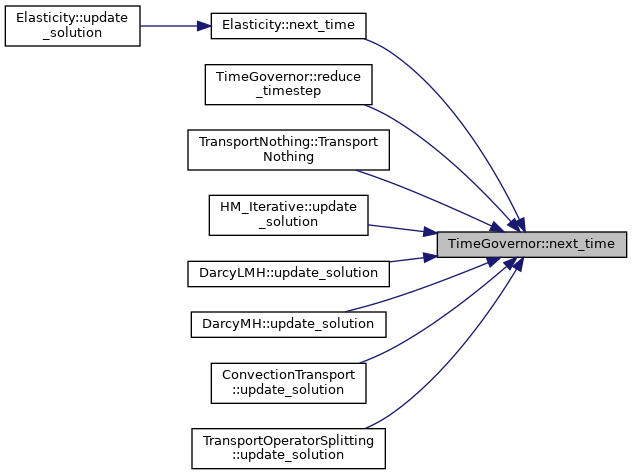
◆ read_coef()
| double TimeGovernor::read_coef | ( | Input::Iterator< Input::Record > | unit_it | ) | const |
Read and return time unit coefficient given in unit_it or global coefficient of equation stored in time_unit_conversion_, if iterator is not defined. Shortcut for time_unit_conversion_ function.
Definition at line 796 of file time_governor.cc.
◆ read_time()
| double TimeGovernor::read_time | ( | Input::Iterator< Input::Tuple > | time_it, |
| double | default_time = std::numeric_limits<double>::quiet_NaN() |
||
| ) | const |
Read and return time value multiplied by coefficient of given unit or global coefficient of equation stored in time_unit_conversion_. If time Tuple is not defined (e. g. Tuple is optional key) return default_time value. Shortcut for time_unit_conversion_ function.
Definition at line 790 of file time_governor.cc.
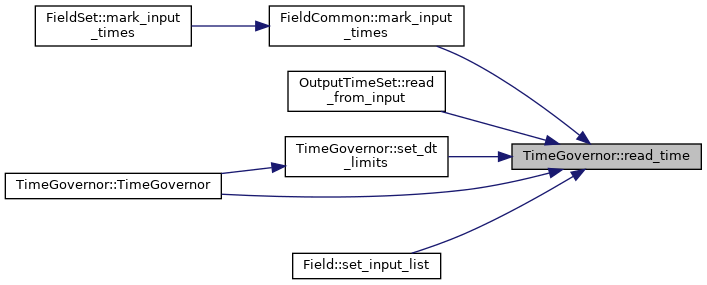
◆ reduce_timestep()
| double TimeGovernor::reduce_timestep | ( | double | factor | ) |
Force timestep reduction in particular in the case of failure of the non-linear solver.
Calling this method also force immediate end of the fixed timestep interval. Returns true reduce factor used. It is larger then given factor if we hit the lower timestep constraint.
TODO: How to keep constraints active for the last next_time call.
Definition at line 728 of file time_governor.cc.
◆ set_dt_limits()
| void TimeGovernor::set_dt_limits | ( | double | min_dt, |
| double | max_dt, | ||
| Input::Array | dt_limits_list | ||
| ) |
Sets dt limits for time dependent DT limits in simulation.
This function should not be normally used. These values are to be set in constructor from the input record or by default.
- Parameters
-
min_dt is the minimal value allowed for time step max_dt is the maximal value allowed for time step dt_limits_list list of time dependent values of minimal and maximal value allowed for time step
Definition at line 462 of file time_governor.cc.

◆ set_lower_constraint()
| int TimeGovernor::set_lower_constraint | ( | double | lower, |
| std::string | message | ||
| ) |
Sets lower constraint for the next time step estimating.
This function can only make the constraint stricter. Lower constraint is reset to min_dt after the next_time() call. The return value mimics result of the comparison: current constraint compared to
- Parameters
-
upper. In particular the return values is: - -1: Current upper constraint is less then the
lower. No change happen. - 0: Current constraint interval contains the
lower. The lower constraint is set. - +1: Current upper constraint is greater then the
lower. No change happen.
Sets lower constraint for the next time step estimating.
- Parameters
-
lower is the lower constraint for time step message describes the origin of the constraint
- Returns
- -1, 0 or 1 according to the success.
- See also
- set_upper_constrain().
Definition at line 573 of file time_governor.cc.

◆ set_permanent_constraint()
|
private |
Sets permanent constraints for actual time step.
Definition at line 536 of file time_governor.cc.
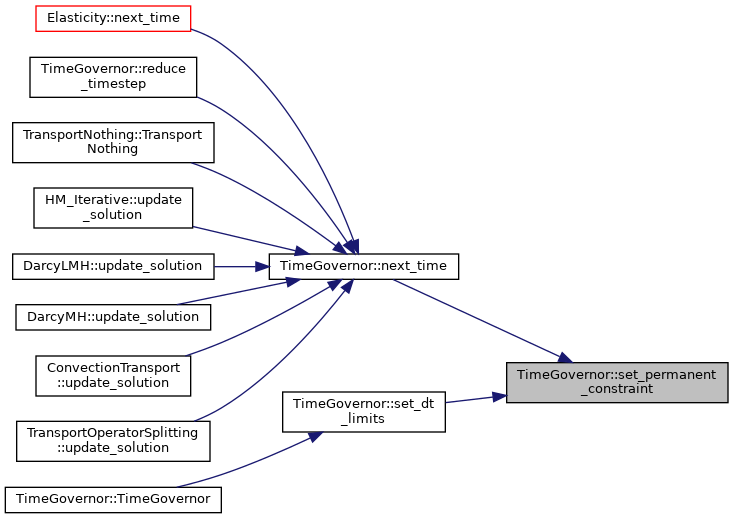
◆ set_upper_constraint()
| int TimeGovernor::set_upper_constraint | ( | double | upper, |
| std::string | message | ||
| ) |
Sets upper constraint for the next time step estimating.
This function can only make the constraint stricter. Upper constraint is reset to max_dt after the next_time() call. The return value mimics result of the comparison: current constraint compared to
- Parameters
-
upper. message describes the origin of the constraint In particular the return values is: - -1: Current upper constraint is less then the
upper. No change happen. - 0: Current constraint interval contains the
upper. The upper constraint is set. - +1: Current lower constraint is greater then the
upper. No change happen.
Definition at line 552 of file time_governor.cc.
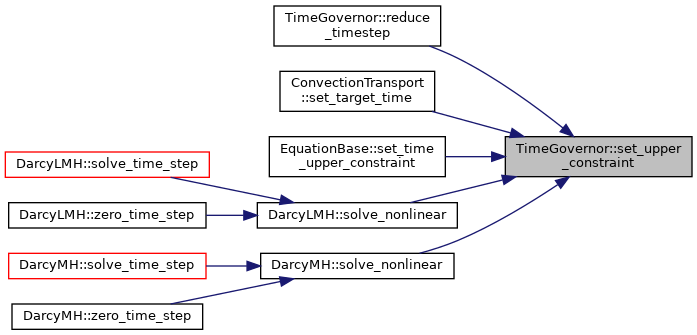
◆ step()
| const TimeStep & TimeGovernor::step | ( | int | index = -1 | ) | const |
Returns reference to required time step in the recent history. Without parameter the actual time step is returned. Use negative indices to get recent time steps: step(-1) the actual step, step(-2) the last one. Use positive index to get time step by its index: step(0) the first time step. However only limited number of last time steps is stored. If the time step is not accessible any more, we throw an exception ExcMissingTimeStep.
Definition at line 753 of file time_governor.cc.
◆ t()
|
inline |
End of actual time interval; i.e. where the solution is computed.
Definition at line 535 of file time_governor.hh.
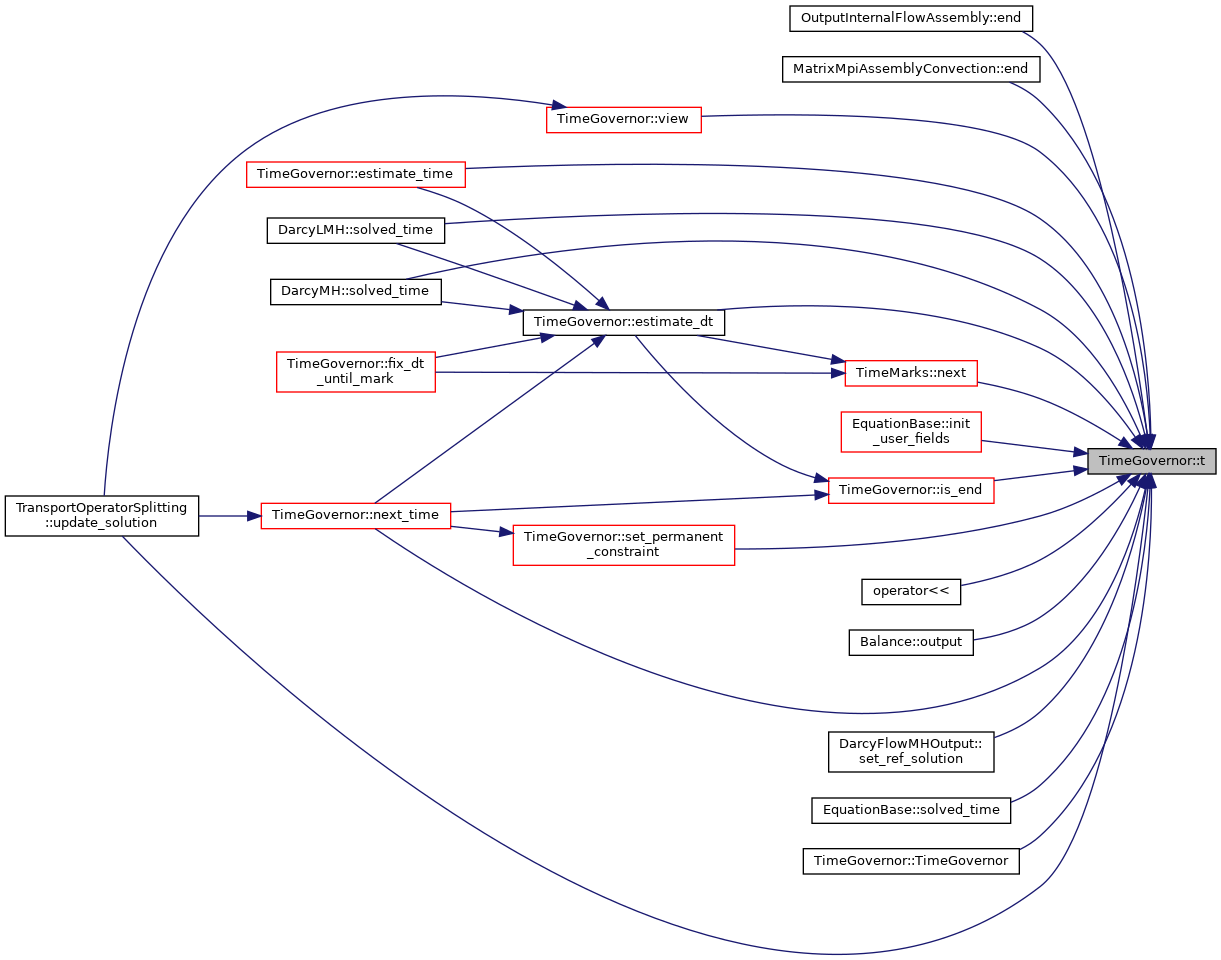
◆ tlevel()
|
inline |
Returns the time level.
Definition at line 600 of file time_governor.hh.
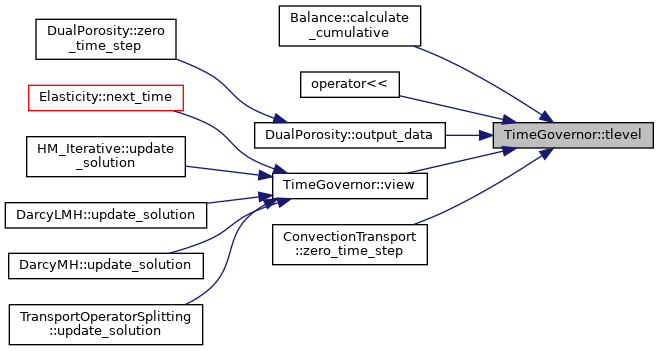
◆ TYPEDEF_ERR_INFO() [1/3]
| TimeGovernor::TYPEDEF_ERR_INFO | ( | EI_BackIndex | , |
| unsigned int | |||
| ) |
◆ TYPEDEF_ERR_INFO() [2/3]
| TimeGovernor::TYPEDEF_ERR_INFO | ( | EI_HistorySize | , |
| unsigned int | |||
| ) |
◆ TYPEDEF_ERR_INFO() [3/3]
| TimeGovernor::TYPEDEF_ERR_INFO | ( | EI_Index | , |
| int | |||
| ) |
◆ upper_constraint()
|
inline |
Getter for upper constrain.
Definition at line 504 of file time_governor.hh.

◆ view()
| void TimeGovernor::view | ( | const char * | name = "" | ) | const |
Prints output of TimeGovernor.
- Parameters
-
name is the name of time governor that you want to show up in output (just for your convenience)
Definition at line 769 of file time_governor.cc.
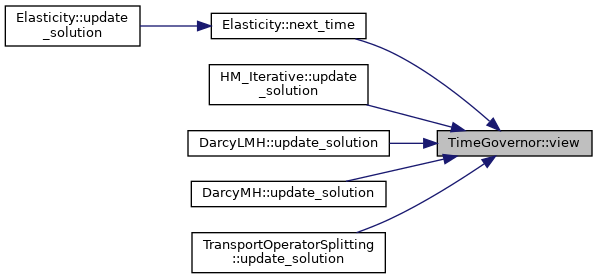
Member Data Documentation
◆ dt_limits_pos_
|
private |
Index to actual position of DT limits.
Definition at line 737 of file time_governor.hh.
◆ dt_limits_table_
|
private |
Table of DT limits.
Definition at line 734 of file time_governor.hh.
◆ end_of_fixed_dt_interval_
|
private |
End of interval if fixed time step.
Definition at line 687 of file time_governor.hh.
◆ end_time_
|
private |
End time of the simulation.
Definition at line 689 of file time_governor.hh.
◆ eq_mark_type_
|
private |
TimeMark type of the equation.
Definition at line 725 of file time_governor.hh.
◆ fixed_time_step_
|
private |
Next fixed time step.
Definition at line 692 of file time_governor.hh.
◆ inf_time
|
static |
Infinity time used for steady case.
Definition at line 638 of file time_governor.hh.
◆ init_time_
|
private |
Initial time.
Definition at line 685 of file time_governor.hh.
◆ is_time_step_fixed_
|
private |
Flag that is set when the fixed step is set (lasts only one time step).
Definition at line 694 of file time_governor.hh.
◆ last_lower_constraint_
|
private |
Lower constraint used for choice of current time.
Definition at line 714 of file time_governor.hh.
◆ last_printed_timestep_
|
private |
Store last printed time to YAML output, try multiplicity output of one time.
Definition at line 746 of file time_governor.hh.
◆ last_upper_constraint_
|
private |
Upper constraint used for choice of current time.
Definition at line 712 of file time_governor.hh.
◆ limits_time_marks_
|
private |
Allows add all times defined in dt_limits_table_ to list of TimeMarks.
Definition at line 752 of file time_governor.hh.
◆ lower_constraint_
|
private |
Lower constraint for the choice of the next time step.
Definition at line 705 of file time_governor.hh.
◆ lower_constraint_message_
|
private |
Description of the upper constraint.
Definition at line 701 of file time_governor.hh.
◆ max_end_time
|
static |
Definition at line 635 of file time_governor.hh.
◆ max_time_step_
|
private |
Permanent upper limit for the time step.
Definition at line 707 of file time_governor.hh.
◆ min_time_step_
|
private |
Permanent lower limit for the time step.
Definition at line 709 of file time_governor.hh.
◆ recent_steps_
|
private |
Circular buffer of recent time steps. Implicit size is 3.
Definition at line 683 of file time_governor.hh.
◆ size_of_recent_steps_
|
staticprivate |
Size of the time step buffer, i.e. recent_time_steps_.
Definition at line 680 of file time_governor.hh.
◆ steady_
|
private |
True if the time governor is used for steady problem.
Definition at line 728 of file time_governor.hh.
◆ time_marks_
When the next time is chosen we need only the lowest fix time. Therefore we use minimum priority queue of doubles based on the vector container. This is one global set of time marks for the whole problem and is shared among all equations. Therefore this object is static constant pointer.
Definition at line 722 of file time_governor.hh.
◆ time_step_changed_
|
private |
Flag is set if the time step has been changed (lasts only one time step).
Definition at line 696 of file time_governor.hh.
◆ time_step_precision
|
static |
Rounding precision for computing time_step. Used as technical lower bound for the time step.
Definition at line 644 of file time_governor.hh.
◆ time_unit_conversion_
|
private |
Conversion unit of all time values within the equation.
Definition at line 731 of file time_governor.hh.
◆ TimeMarks
|
private |
Definition at line 754 of file time_governor.hh.
◆ timestep_output_
|
private |
Special flag allows forbid output time steps during multiple initialization of TimeGovernor.
Definition at line 749 of file time_governor.hh.
◆ timesteps_output_
|
private |
Handle for file for output time steps to YAML format.
Definition at line 743 of file time_governor.hh.
◆ timesteps_output_file_
|
private |
File path for timesteps_output_ stream.
Definition at line 740 of file time_governor.hh.
◆ upper_constraint_
|
private |
Upper constraint for the choice of the next time step.
Definition at line 703 of file time_governor.hh.
◆ upper_constraint_message_
|
private |
Description of the upper constraint.
Definition at line 699 of file time_governor.hh.
The documentation for this class was generated from the following files:
- /home/runner/work/flow123d/flow123d/src/tools/time_governor.hh
- /home/runner/work/flow123d/flow123d/src/tools/time_governor.cc
